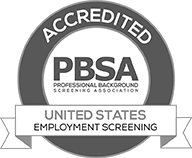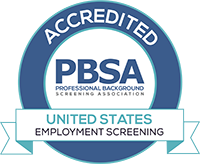BLOG
San Diego Created A Law Regarding The Use Of Criminal Records
November 5, 2024
Legislators in San Diego passed an Ordinance which created specific requirements for employers regarding how and when they may use criminal records during the hiring process.
About The Fair Chance Ordinance
San Diego legislators implemented Ordinance #10914, also known as the Fair Chance Ordinance. It established regulations regarding an employer’s use of criminal records for employment purposes. The document started by noting that one in five California residents have some type of criminal record and that any conviction can make it difficult for people to find jobs, housing or other necessities.The Fair Chance Ordinance is intended to “dismantle employment barriers” in San Diego county. It creates laws for employers and provides a process for applicants to file complaints about “discriminatory hiring practices.”
Unlawful Employment Practices
Ordinance #10914 says it is unlawful for employers in the area to:- State in any job ad or related documents that simply having an arrest or criminal record will make a person ineligible.
- Include questions about a candidate’s criminal history in job applications or other employment documents.
- Ask any candidate about their criminal history before extending a conditional job offer.
- Consider arrests that did not result in convictions or convictions that have been sealed, dismissed or expunged.
Conditional Offers
After extending a conditional offer, employers may request a criminal background check. If the results cause them to consider an adverse action, they must first conduct an individualized assessment to help determine whether the conviction has a “direct and adverse relationship with the specific duties of the job that justify denying the applicant a position.” During this process, employers shall consider:- The nature and gravity of each offense.
- How much time has passed since an offense or the completion of the person’s sentence.
- The nature and responsibilities of the position.
Before taking an adverse action, employers need to be able to show that the offense or conduct has an adverse relationship to one or more elements of the position being sought. When this happens, the applicant is to be notified in writing and informed about the disqualifying conviction as well as their right to file a complaint. Applicants will then be given five business days to respond before a decision is finalized. If the applicant files a dispute and explains they are working to obtain proof, the employer must allot them another five business days.
Filing Complaints
If an applicant believes they have been treated unfairly, they may file a complaint with the Office of Labor Standards and Enforcement (OLSE). Upon receiving a complaint, the OLSE may:- Require the employer to provide access to company records.
- Issue a Notice to Correct the situation.
- Submit penalties and other forms of relief as of July 1, 2025. This can include fines of up to $5,000 for each complainant for the first violation, $10,000 for the second and $20,000 for subsequent violations.
Employers In San Diego
Every employer in San Diego should be aware of this Ordinance and prepared for compliance. It went into effect on October 10, 2024. The law covers entities that have five or more employees and operate in the unincorporated areas of San Diego County.
Running Background Checks
While laws like this Ordinance are intended to give people second chances, no law prohibits background screening for employment purposes. Background checks are a crucial part of the hiring process. They help hiring managers make informed decisions, maintain safe workplaces and conduct due diligence.
If your organization is bringing on employees, contractors or volunteers, please contact us. Our friendly, knowledgeable team can help you customize screening packages that are perfectly tailored for any position. We’re available to assist you Monday through Friday from 5am to 6pm PT.
#SanDiegoLaw #CriminalRecords #SecondChances #BackgroundChecks







